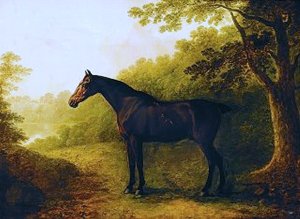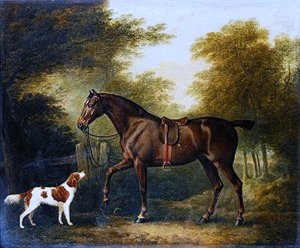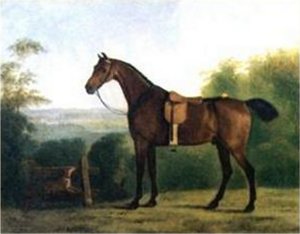Home
Contents
Index
Bottom
Main Entry
| Thomas Boultbee (1753 - 1808)
|
The "Painter Twins"
|
| John Boultbee (1753 - 1812)
|
(written by the Editors)
From the Victoria County History of
Leicestershire Victoria County History of Leicestershire, Vol V, 1955
Edition, and an important article by Walter Shaw Sparrow in a 1933 issue
of the periodical The Connoisseur has come much additional information
on the artistic careers of the twins.
The family tradition that they were pupils
of Sir Joshua Reynolds is, however, improbable and was very likely
inferred from the fact that in 1775 they both entered the Royal Academy
Schools during Sir Joshua's Presidency of the Royal Academy. In that
year they each exhibited three pictures at the Free Society, London,
their address being 83 Oxford Street.
Such early exhibiting must
indicate that they had already had some training before entering the
Royal Academy Schools. In 1776, they showed three pictures each at the
Society of Artists while John had one, and Thomas two, landscapes
exhibited at the Royal Academy. The next year only Thomas exhibited,
showing at the Royal AcademyA View of Staunton Harold, his address now being 347 Oxford Street.
It then appears that they both left London
and there was an interval of several years before they again exhibited
there. Up till then, their works had been landscapes or portraits.
(Thomas certainly painted or drew several members of his family.)
However, in 1783 Thomas showed three pictures at the Royal Academy, his
address was then Derby. John re-appeared at the Royal Academy in 1787
and 1788, on each occasion with two horse paintings, in the latter year
one beingA Favourite Horse of Mr. Bakewell. His
address was now Loughborough. (Robert Bakewell (1725 - 1795) was a
pioneer livestock breeder and a Leicestershire man. A painting by John
of him on horseback with cattle in the background is in the Leicester
Museum, and is probably an early painting. See below.)
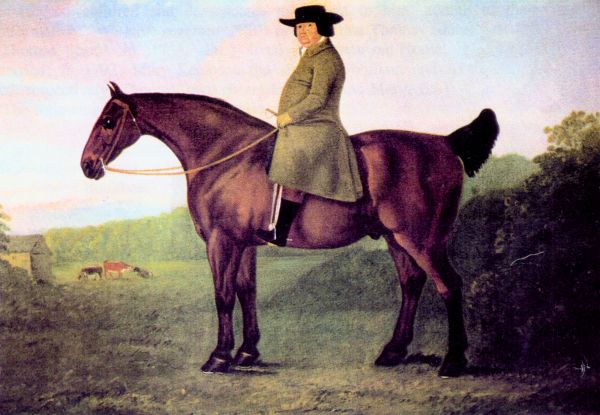
|
| Robert Bakewell, Pioneer Livestock Breeder
|
Thomas married in 1792 and thereafter lived
in Shropshire. He does not appear to have exhibited after his marriage
whereas John was still painting in the last year of his life and indeed
was most prolific, his speciality being horse studies. He was well
supported by patrons among the Leicestershire squirearchy and also had
much grander connections, noble patrons including the Duke of Bedford,
Lord Mount Edgecombe and the Earls Spencer, Derby and Egremont. In 1797
he painted for the latterThe Mare Johanna with a Portrait of Mr. Thomas Birdwhich
is believed to be still at Petworth House, Sussex, together with a
series of paintings depicting various breeds of cattle. Two of these
have views of Windsor Castle in the landscape backgrounds and probably
represent Royal livestock.
TPB states that John was employed by King
George III and this seems the appropriate point to include an amusing
anecdote added to one of the two manuscript copies of the History used
by the Editors though the handwriting cannot be identified nor is there
any indication as to when it was added.
One day during the time of Mr. Boultbee's
residence in Windsor Park the King (George III) told him that he was
suffering from toothache and that he feared he would have to have the
tooth removed. Mr. Boultbee sympathised with the King, saying that he
could well understand his suffering as he himself had lately been
troubled in the same way.
About a fortnight afterwards the King
decided that he must undergo the operation and the Royal dentist was
sent for. The King took his place in the chair and all was in readiness.
Suddenly he seized the dentist's hand and shouted "Stop! Mr. Boultbee
has a bad tooth, he shall have his out first!" Messengers were sent to
find Mr. Boultbee and after some delay he arrived hot and flurried at
the Castle when the King explained that he was to have his tooth out
first. It was in vain for Mr. Boultbee to explain that he was in no pain
and had not been for some time, that in fact he did not require a
dentist at all. All was useless, the King became very excited, and in
the end the unlucky artist had to sit down and have a perfectly good
tooth removed. He vowed afterwards that he would never condole with
anyone in pain again.
(This sounds like the voice
of Uncle Joe and here he definitely is again in a further Royal anecdote
mentioned by Walter Ernest Boultbee in a pencil note in JB's copy of
the History.)
I remember Uncle Joe
telling us on the visit to Bidford of some tale about the King coming to
visit John one morning and finding him in bed, or something of that
sort -- you may remember the tale. What the King said to him and a
rather smart reply he made. "No, I don't."writes JB firmly. (This story cannot have been told to Walter Ernest later than 1865, the year when Joseph Bage died.)
|
Returning to John's history and art, in 1812
he moved from Chester to Liverpool where he exhibited eight pictures at
the Liverpool Academy in that year, one beingPortrait of the Earl of Derby's Racehorse and Sire Sir Peter Teazle. Another famous racehorse he painted Derby winner Highflyer is shown below.
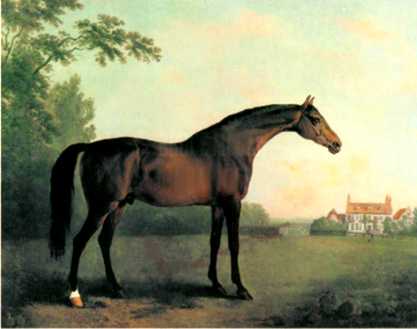
|
| Highflyer
|
His son John (1785 - 1843) evidently
inherited his talent though we know no more than that he had three
pictures in the 1812 Liverpool Academy Exhibition followed by one in the
next year --Wounded Stag taking the Water.
TPB names various paintings by the elder John, that ofRichard III at Bosworthwas engraved.Gulliver among the Houhnymsis
still in the family, a large rather dark painting, as are also several
horse paintings though none with figures. The horses are always most
beautifully done, usually with a romantic landscape background with
John's characteristic pink-tinged clouds. His figures are not really his
strong point, though interesting they are somewhat wooden. John's
paintings still come up for sale occasionally, now commanding high
prices. There are likely to be still many more in smaller English
country houses where the late 18th or early 19th century squire had
wished to record his favourite hunter. Though not in the first rank,
epitomised by Stubbs, John nevertheless has a firm position among
English sporting painters.
A newspaper item headedWhere have all the Boultbees gone?appeared in theLoughborough Echoon
May 28, 1976. The item lamented the lack of paintings by John Boultbee
in Leicestershire. Only one was found, the one noted above that is in
the Leicester Museum. The writer was Clifford Owen, Deputy Director of
Leicestershire Museums, Art Galleries and Records.
We think it will be agreed from the above
that TPB's and JB's criticisms of John's art and his diligence in
pursuing it was somewhat wide of the mark. We reproduce below a
representative series of his paintings. Some of Thomas' family portraits
are shown on preceding pages.
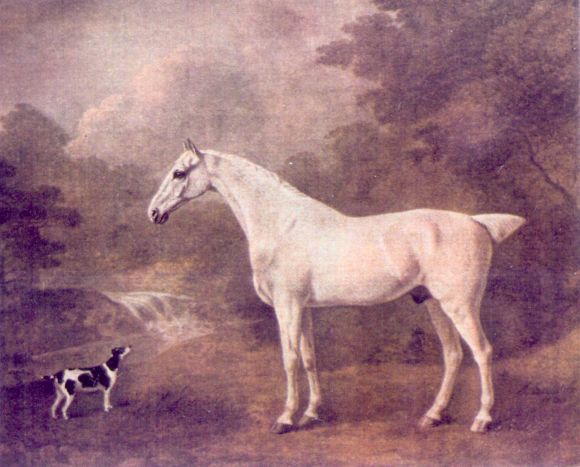
|
| A Flea-Bitten Grey and a Spotted Terrier
|
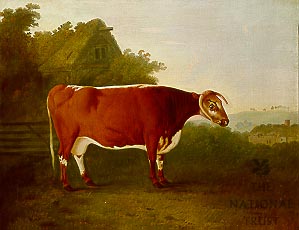
|
The Broken Horned Beauty
NT Shugborough Hall, Staffs
|
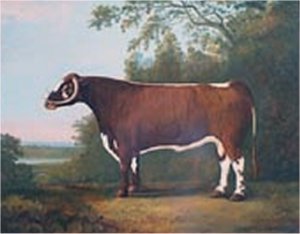
|
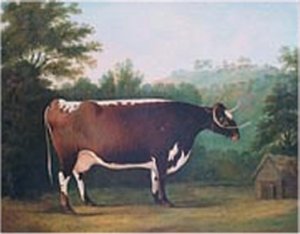
|
| Horned Cattle
|
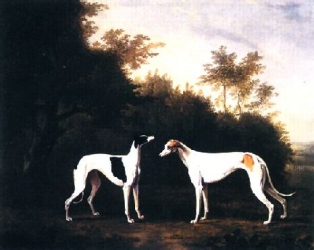
|
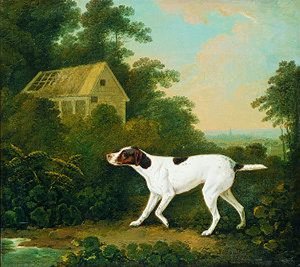
|
| Two Greyhounds
|
A Pointer in a Landscape
|
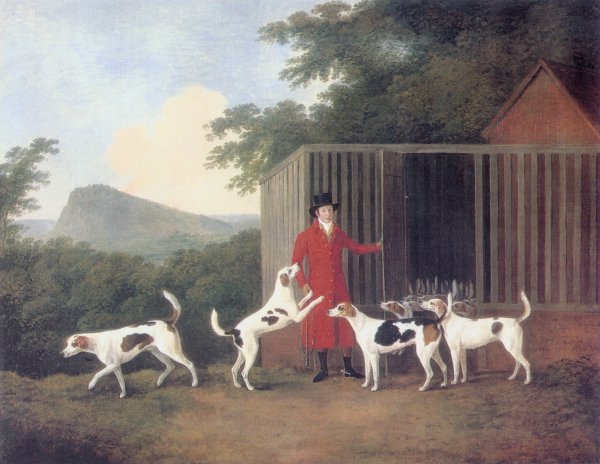
|
A Kennel Huntsman with his Hounds,
Beeston Castle beyond (1803).
|
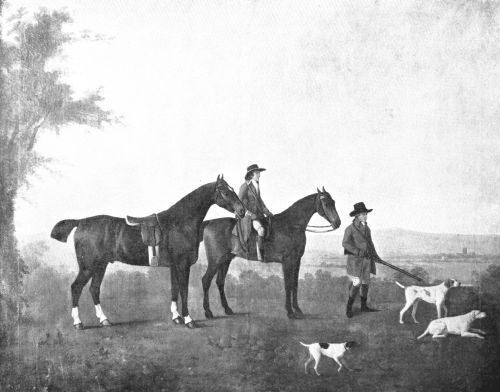
|
Charles James Packe, the Younger, shooting at Prestwold,
Leicestershire, accompanied by his servant Bonum.
|
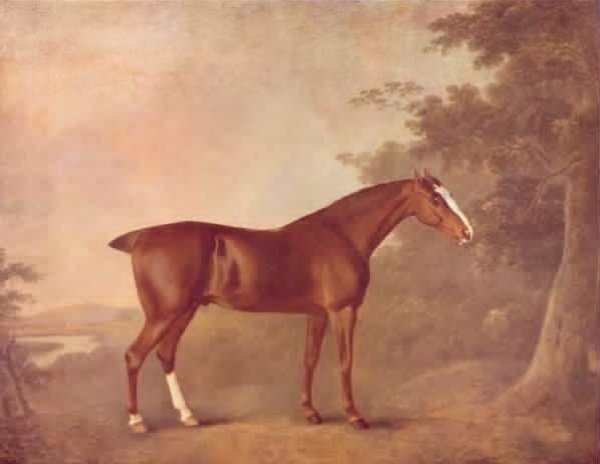
|
| A Dark Chestnut (1788)
|
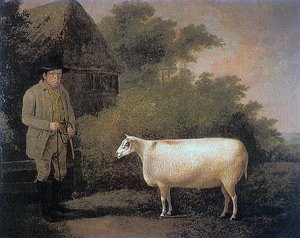
|
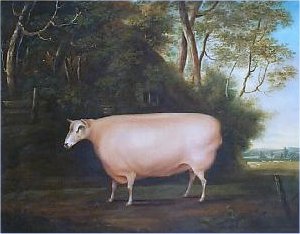
|
| Rams
|
If anyone knows the current whereabouts of any of the Twins' works please e-mail me at
Ditch@Boultbee.Freeserve.co.uk
Main Entry
Home
Contents
Index
Top
©












